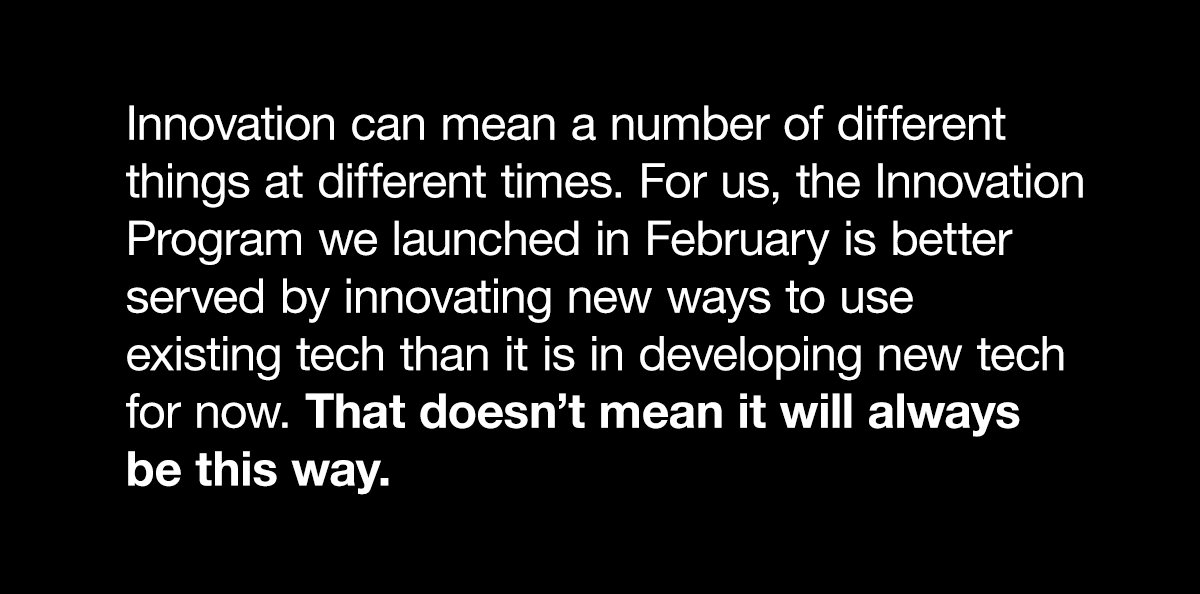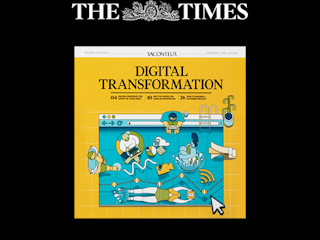In September 2019, Valtech launched its new Innovation Program. Different proofs of concept (POCs) were already being implemented in voice and VR. The following February, we presented the program to our clients, looking to kick things off in earnest. Of course, the Innovation Program wasn’t the only thing to hit around that time. It just so happened that COVID-19 began picking up steam around then as well. The question became, do we dump the new program all together, or do we find a way to move forward with it in the face of a global pandemic?
Valtech Innovation Program
Building the future relies on innovation. No advancement, technological or otherwise, has ever been achieved without it. As a tech company, we strongly believe that innovation has to be in concert with our customer. The best innovation isn’t completed by a small group of people in one place, it’s done with the customer not only in mind, but as a key part of the process.
The Valtech Innovation Program is based on this philosophy: We identify new ideas that address persistent client challenges, propose solutions that have never been tried before, and then develop proofs of concept to prove out and tweak the solution before full deployment.
 What does this mean in a practical sense? Say one of our clients comes to us wanting to ameliorate the customer experience. We try to find new ways of interactions by leveraging new technologies. For example, we are using voice-activated technology in a new manner. For example, we came up with the idea to leverage voice recognition with an AR layer to create a better experience in video conferencing.
What does this mean in a practical sense? Say one of our clients comes to us wanting to ameliorate the customer experience. We try to find new ways of interactions by leveraging new technologies. For example, we are using voice-activated technology in a new manner. For example, we came up with the idea to leverage voice recognition with an AR layer to create a better experience in video conferencing.
Valtech experts are selected based on innovation streams and industry knowledge. The intention is to get a number of different POCs completed in six different categories before the year ends:
- Dynamic Store
- Enhanced Reality
- Voice Interfaces
- AI Personalization
- Beauty Tech
- Social Commerce
Shifting Focus During COVID-19
As stated, this program was announced in February, and almost immediately after, COVID-19 hit North America and caused a lot of businesses to change their focus and their practices. Because the Innovation Program depends on customer participation to work, the notion that a number of our customers were putting projects on hold meant we had to think about the potential future of the program.
Instead of giving up and shifting our focus to what we needed to do to gain easy wins for ourselves, we thought about ways we could shift the priority of the Innovation Program to better meet the needs of our clients during this difficult time. With that in mind, the decision was made to bring the minds behind the program together with our account managers and start brainstorming different, innovative ways we could help support our customers.
For example, in the aftermath of COVID-19, we contacted one of the largest companies in Canada responsible for managing nursing homes and assisted living facilities with an idea that would help keep their at-risk residents safe. Elderly residents needed to practice social distancing, however the unplanned nature of social visits and staff servicing made it difficult for residents to be prepared for constant outsiders coming into their sanitary, safe rooms.
 Additionally, public spaces were no longer a viable place to gather. To address this urgent issue, Valtech proposed repurposing a very efficient booking tool (initially developed to plan Santa visits in malls) to allow residents to make appointments and digital meetings with friends, family members, and even volunteers who might be able to help them meet their daily needs. Due to the ease of use of the platform, it is possible to quickly adjust it to help keep elderly people connected when the spaces they normally congregate in have been closed down and everyone is working to practice social distancing. It's important to note that the customer didn't run with this option, but they did love the idea and the intiative shown in coming up with the innovation.
Additionally, public spaces were no longer a viable place to gather. To address this urgent issue, Valtech proposed repurposing a very efficient booking tool (initially developed to plan Santa visits in malls) to allow residents to make appointments and digital meetings with friends, family members, and even volunteers who might be able to help them meet their daily needs. Due to the ease of use of the platform, it is possible to quickly adjust it to help keep elderly people connected when the spaces they normally congregate in have been closed down and everyone is working to practice social distancing. It's important to note that the customer didn't run with this option, but they did love the idea and the intiative shown in coming up with the innovation.
In this sense, the Innovation Program’s current drive during the COVID-19 crisis isn’t to bring in customers and co-invest in new projects. The program currently exists to think of new applications and uses for the technology and platforms we’ve already created which will immediately benefit our customers and our community at large. Whether that’s a new way to repurpose and redesign a platform, or it’s a way to take something we’ve already created and make small changes to it so it’s more applicable to the current needs, we’re sending the message that we’re here for our customers during these trying times.
Innovating into the Future
In a time of crisis, the most important thing we all can do is come together to find ways to help each other and to serve our community. The best way to do that is to leverage what you know in a manner that can do the most possible good. At Valtech, that means taking what we know about technology and taking the work we’ve already done, and finding new ways to use it to the betterment of others.
 Innovation can mean a number of different things at different times. For us, the Innovation Program we announced to the world in February is better served by innovating new ways to use existing tech than it is in developing new tech for now. That doesn’t mean it will always be this way.
Innovation can mean a number of different things at different times. For us, the Innovation Program we announced to the world in February is better served by innovating new ways to use existing tech than it is in developing new tech for now. That doesn’t mean it will always be this way.
Valtech is still very interested in leading the pack when it comes to co-innovating with our customers. It is our plan for the program as outlined earlier to resume as scheduled as soon as the worst of COVID-19 is behind us and we’re back to some kind of normal. In the meantime, we’ll keep working to innovate in different ways than expected.







